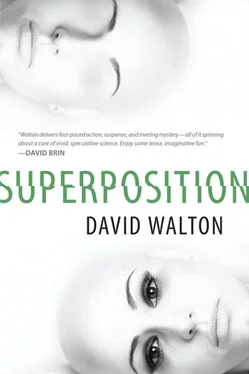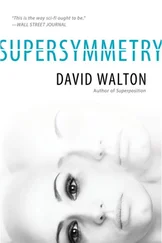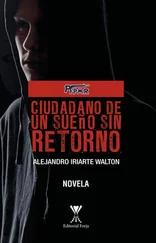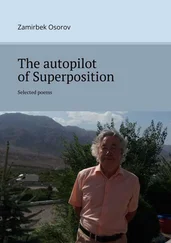“Haviland’s scoring points with that big interactive whiteboard of his,” I said after Terry arrived. “It looks like a string of facts. I got angry with Brian at time A, and then I killed him at time B. Case closed.”
An armed guard stood just outside, able to see everything that happened in the room, but—supposedly—unable to hear through the soundproof glass.
“That’s not true,” Terry said. “Don’t undersell the jurors; they can tell the difference between graphics and evidence.”
“Can they?” I asked. “Then I guess they’ll just focus on the fingerprints and the blood on my shoes. Innocent for sure.” I was out of my cell but still feeling helpless. Nothing I could do would change the outcome of this. All I could do was watch. “One of these days,” I said, “I’m going to just get up and punch Haviland in the head.”
“You know you can’t do that.” Terry looked at his watch. We were just waiting, talking idly, but of course he was still billing by the quarter hour.
“I know,” I said. “I understand, believe me. But you have to understand me, too. I hate just sitting by and watching while other people determine my fate. It makes me feel like hitting something.”
The guard opened the door, and Jean Massey came in, breathing hard. “Sorry I’m late,” she said. “It was murder finding parking.” She gave an embarrassed chuckle and glanced at me nervously. “In a manner of speaking.”
Jean was our expert witness. Obviously, I couldn’t do it, and we needed someone who could explain the science of the case to the jury. I had given Terry a list of colleagues from the NJSC who could effectively speak about quantum concepts, and Jean was the only one who had said yes. She wasn’t ideal, since she was a friend, and thus could be considered less than objective, but she was willing, and she knew what she was talking about, and that counted for a lot.
We had gone over her testimony before, but Terry still had a tendency to forget key components of the science, or else refer to it using language that made no sense, betraying his lack of basic understanding. That wasn’t necessarily a bad thing—the jurors would be in the same boat, and seeing that he didn’t understand it either would help them connect with him and his questions. But he had to understand it well enough to get the questions right.
“So, tell me about these resonators again,” Terry said. “I’m having trouble remembering why two spinning doodads smaller than a clipped fingernail are so important.”
The question seemed to spark Jeannie’s enthusiasm. “One word,” she said. “Superposition. Let’s try explaining it another way. Do you have a coin?”
Terry rummaged around in his pockets. “Somewhere around here, I think.” Ever since the United States had pulled coins out of circulation, leaving the dollar bill as the lowest legal denomination, metal coins were getting harder to find. Ask my daughters what a nickel or a dime was and they probably wouldn’t know. Finally, Terry came up with an old, blackened penny. “I keep it for luck,” he said.
Jean flipped the coin up with her thumb, let it fall on the tabletop, and slapped it flat. With her hand still covering it, she asked, “Which side is up?”
“I don’t know,” Terry said, playing along.
“So, at this point, it could be in either of two states, heads or tails, right?”
“No,” Terry said. “It’s only in one state. I just don’t know which one it is.”
Jean grinned. “A true lawyer talking. And as far as the coin is concerned, I’d have to agree with you. But in the quantum world—if this were an electron with two possible spin states, say, instead of a coin—it no longer holds. The electron is actually in both states at the same time. It’s not until you look at it”—she lifted her hand, revealing the head of Abraham Lincoln, barely visible through the grime—“that it resolves into a single state.”
“That’s just silly,” Terry said. “If you can’t see it, how do you know it’s not already in one of those states, just like the coin?”
Jean and I traded a look. “Here we go,” I said.
Jean took a deep breath. “Okay. New example. Imagine there’s a tennis ball bouncing back and forth between these two walls. It never slows down or falls; it just keeps bouncing back and forth endlessly.”
“Okay,” Terry said.
“We turn off the lights, and you pull out your camera and take a flash picture. What do you see?”
“A green dot, in the air, somewhere between the walls.”
“Is it any more likely to be in one place than another?”
“Not if it’s moving at a constant speed, and assuming the impact with the walls doesn’t slow it down.”
My respect for Terry increased the more time I spent with him. All his answers were precise, and he seemed ready to sit there all day until he understood what Jean was talking about. He could have been a scientist. Though I suppose if he’d gone that route, he wouldn’t be able to bill four hundred dollars an hour.
“Let’s say you take a thousand pictures, or a million, and merge them together,” Jean said. “What would you see?”
“A set of green dots stretching from wall to wall,” Terry said. “A solid green line, if I took enough pictures.”
“Right. So now we’ll step into the quantum world. Say this was an electron instead of a tennis ball, though any particle would do. When you look at your million pictures, what you will see is a pattern where some areas have the usual number of green dots, some areas have twice as many dots, and some areas have no green dots at all.”
Terry gave her a skeptical look. “None?”
“None.”
“So no matter how many pictures I took, I would never catch the ball in those spots.”
“The ball never is in those spots.”
“So how does it get from wall to wall?”
I laughed, enjoying his consternation. I could tell he thought he was missing something, but he wasn’t. The truth is, everyone is confused by quantum physics, no matter how much they’ve studied it. We learn all the technical jargon, and we can do all the math, but nobody really understands it, because it defies all common sense. “It gets worse,” I said. “Trust me, it gets a lot worse.”
“Let’s say you don’t believe this is actually possible,” Jean said, “so you hire one of your interns to hold a tennis racket in the path of the ball, right at one of those blank spots where the ball never appears in your pictures.”
“In the dark,” Terry said.
“Yes.”
“And I take some more pictures. Let me guess: the ball keeps bouncing back and forth against the walls, as if the racket wasn’t there.”
“You’ve got it,” Jean said.
“You should have been a physicist,” I said.
“Okay, so what really happens? Does the tennis ball—the electron—fly right through? Or go around? I’m losing the thread here.”
I stepped in. “The point is, electrons and protons and neutrons are very different than tennis balls. The tennis ball is made out of them, but they’re not the same thing at all. The electron isn’t bouncing back and forth, not really. It exists everywhere between the two barriers at the same time, at some probability. This is the probability wave—the chance that it will be in any given spot when you look at it. The tennis ball has a probability wave, too, only its wave averages out to be consistent with how we experience the world. The electron’s probability wave doesn’t make any normal sense at all.”
“That’s the concept of superposition,” Jean said. “Being in more than one place, or more than one state, at the same time. You can overlay multiple probability waves on this poor electron, like overlapping wakes from two different boats on the ocean, changing the probability that it will or will not be in any given place.”
Читать дальше












